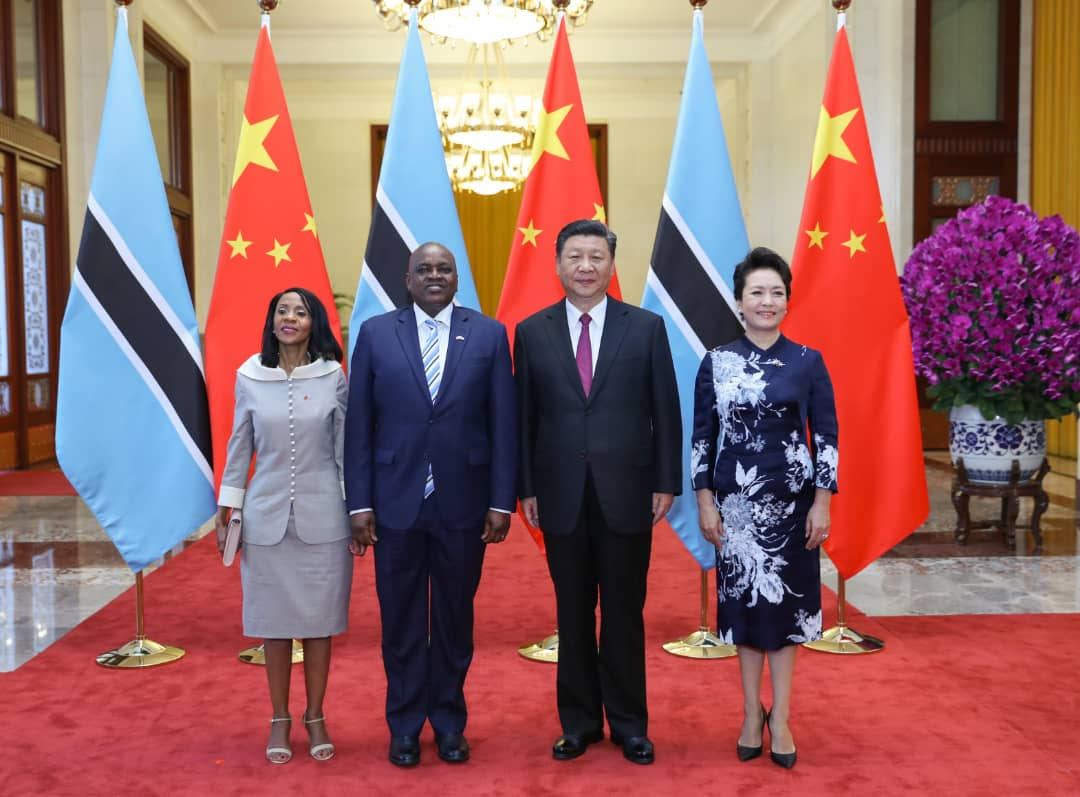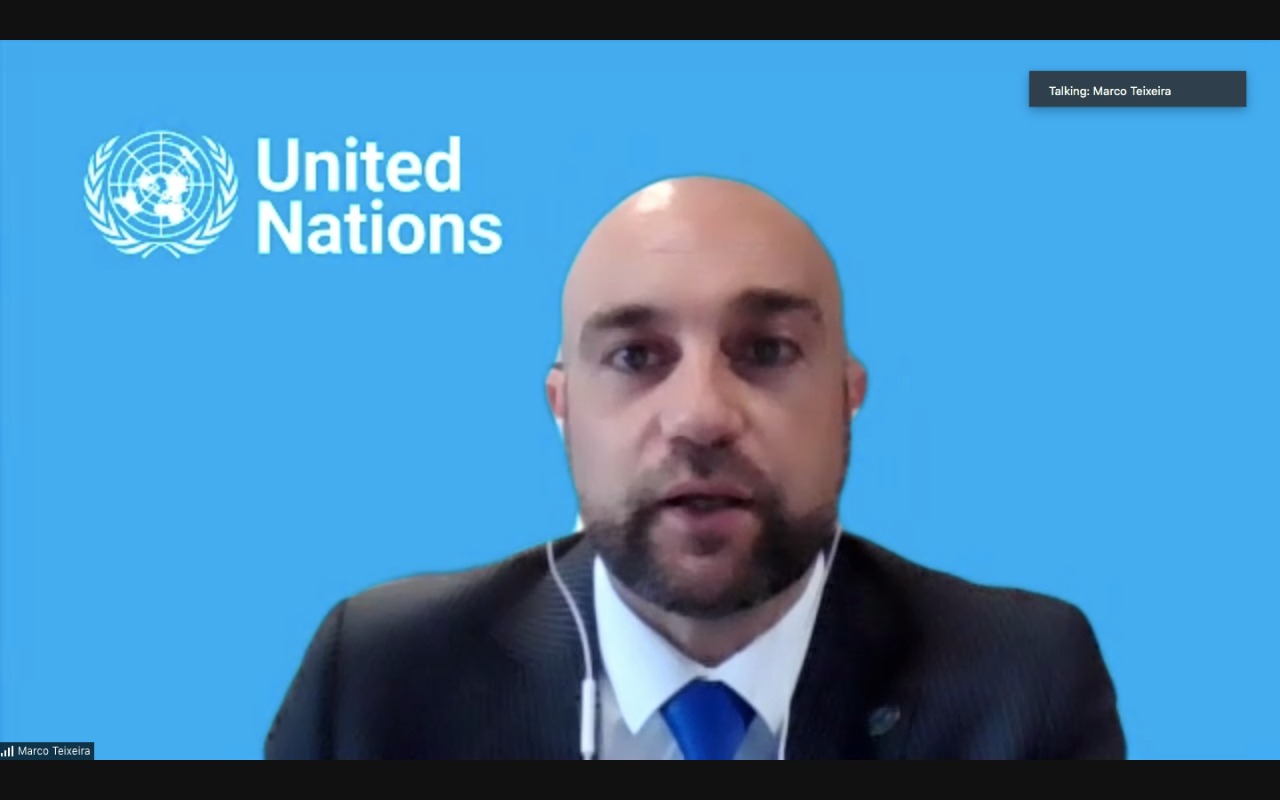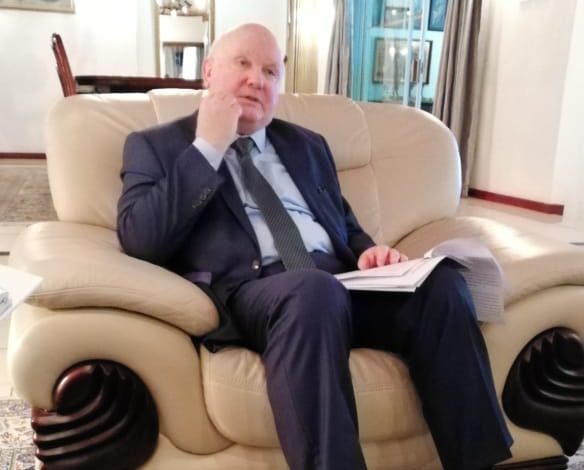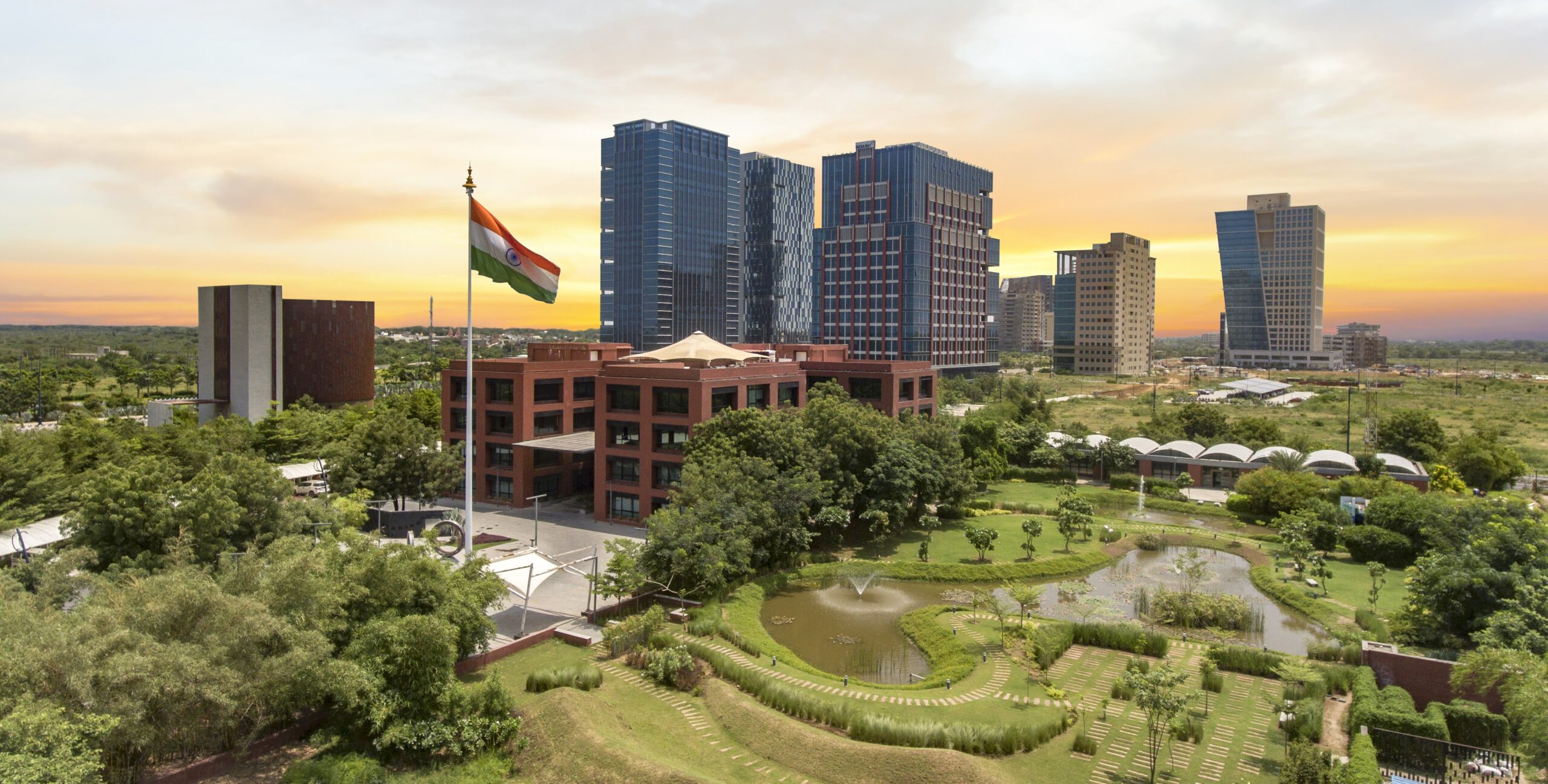
Presidents Xi Jinping,, Mokgweetsi MAsisi and their spouses during Masisi's state visit
By Chedza Mogae
Here in Botswana, the 1st of July, is a day in which we honour, observe and remember, the singular contribution of this nation’s first President, Sir Seretse Goitsebeng Maphiri Khama, one of the founders of the ruling Botswana Democratic Party, during whose presidency (30 September 1966 – 13 July 1980), this country underwent rapid economic and social progress.
July 1st, 2021, would have been the 100th birthday, of this exceptional man, and arguably, one of Africa’s greatest visionaries. To say the man was a luminary, is no exaggeration, he was influential and inspirational, both as a factor of his pedigree, but more unique, his particular persona.

For those that never had the honour of his acquaintanceship in life, there exist many testimonials, that attest to the quality of the man; his aspect, his intellect, his humour, his incomparable oratory, his ability to laugh at himself… his astounding humility… that were key to his particular brand of charisma.
It is the African way, when we eulogize and laud our heroes … to embellish our recollections, with mythical exaggerations or perversions of truth … the legend that is, was and will always be, Seretse Goitsebeng Maphiri Khama, is standalone, it requires none of this.
Attested to by the fact, that we take a moment each year, to celebrate the man, his wealth of accomplishments and how he brought this nation together in common purpose. It is only fitting and proper that we pause and remember.
And whether as a result of serendipity, fate or chance; the day we dedicate to paying tribute to Sir Seretse Khama, is noteworthy too, in a country to which, he was among the first Batswana to visit. In his capacity as head of state Sir Seretse Khama, paid the first official visit, by a President of this republic, to the People’s Republic of China (PRC) in 1976.
And the date of his birth, the 1st of July, marks the day of remembrance, in which the People’s Republic of China, take a moment in time, to mark the centennial birth of the political entity, known as the Communist Party of China – an organisation that has propelled, the aspirations of over a billion people; taking China from the impoverished, war-torn rural society it was, to being, “the fastest sustained expansion by a major economy in history” (World Bank).
Or, more appropriately, in the words of one of China’s greatest revolutionaries and statesmen, Deng Xiaoping – who served as the paramount leader of the People’s Republic of China (PRC) from December 1978 to November 1989 – elevated the PRC into the ranks of “小康社会” (pinyin: xiǎokāngshèhuì) the ‘moderately prosperous society, it is today. In fact the world’s second largest economy.
In most progressive societies, whereby nation building is the priority, and the People’s Republic of China, is one such, there are days set aside for contemplation; of the past, in all its manifestations – and the expression/idiom that immediately springs to mind, ironic, in that it’s an American colloquialism (from the country that is China’s greatest rival) – and they then determine for themselves, “the good, the bad and the ugly” of their recent past.
They evaluate; their point of departure, whether their lives back then … were satisfactory and had meaning… it is human nature to aspire to better itself. Though the notion of what furtherance and advancement are, differ with human traits and characteristics, that vary between populations and deviate amongst cultures.
So then, realising this potential, these societies, undertake with reasoning and imagination, this assessment, and then devise a means of, intended at arrival at a certain “place”, a particular advent. In the modern world, we have measures for this, we call it socio-economic development – “a planned and comprehensive economic, social, cultural and political process, in a defined economic area, that is oriented and aims to continually improve the well-being of the entire population”.
This, in theory, is the fundamental role and responsibility of governments, the parties that lead them, whatever compound form their political, economic and social arrangements take. Better said, “The true measure of any society can be found in how it treats its most vulnerable members.” (Mahatma Gandhi).
By that definition alone, we must pause, appreciate the breadth and scope and the enormity of the unparalleled achievements of the Communist Party of China. Acknowledging this commemoration as legitimate, more than ample cause for celebration and allow the CPC, its moment.
July 1st, is salutation to an organisation that was birthed, secretly, by a group of Chinese revolutionaries, in a room in the now modern-day miracle that is the commercial capital of Shanghai, in July of 1921.
Ancient China gave the world, the “four great inventions”: papermaking, printing, gunpowder and the compass – developments that literally changed the world. Since that time, modern-day China, under the stewardship of the CPC have given us similar inspirations, and we can utilise, objective measures, as gauges of the CPC and China’s myriad of accomplishments.
China came closest of all the world’s nations to realising the ambitions set forth in the United Nations Millennium Development Goals (MDGs), eight international development goals, agreed upon following the Millennium Summit of the United Nations in 2000.
All 191 United Nations member states (at that time), and at least 22 international organisations, committed to help achieve the following Millennium Development Goals by 2015, those being; to eradicate extreme poverty and hunger, to achieve universal primary education, to promote gender equality and empower women, to reduce child mortality, to improve maternal health, to combat HIV/AIDS, malaria, and other diseases, to ensure environmental sustainability and to develop a global partnership for development.
China has lifted more than 850 million people out of extreme poverty, representing over 70% of the total world figure. By lifting these millions out of poverty, the country met its Millennium Development Goal of halving its share of the world’s hungry by 2015, which simultaneously reduced the global hunger rate by two thirds.
By the end of 2000, the country had basically achieved the goals of popularising its nine-year compulsory education and eliminating illiteracy among young people. In 2006, China revised the Compulsory Education Law, providing for free compulsory education.
And by 2011, the net enrolment rate of primary-school-age children reached 99.8 percent, accomplishing universal access to primary education ahead of the 2015 deadline.
China is the most populous country in the world, and women account for 48.69% of the total population of 1.4 billion. Since 1995, China has formulated and implemented three rounds of the Program for the Development of Chinese Women.
As a national action plan that promoted the development of women, it was designed to promote the full development and protection of women’s rights in terms of health, education, economy, participation in decision-making and management, social security, environment, laws, and so forth.
In 2014, China ranked 37th out of 187 countries on the United Nations Development Programme’s Gender Inequality Index (GII – unlike the Human Development Index, higher values in the GII indicate worse achievements.).
Among the GII components, China’s maternal mortality ratio was 32 out of 100, 000 live births. In education 58.7 percent of women age 25 and older had completed secondary education, while the counterpart statistic for men was 71.9 percent.
Women’s labour power participation rate was 63.9 percent (compared to 78.3 percent for men), and women held 23.6 percent of seats in the National People’s Congress. By 2019, China had improved these figures significantly, across the board, ranking 106 out of the 153 countries surveyed.
Child healthcare in China has made remarkable progress. The infant mortality rate of China fell gradually from 76.76 deaths per thousand live births in 1971 (7.7%) to 9.04 deaths per thousand live births in 2020 (0.9%). China’s MDG target of reducing the infant mortality by two thirds, was achieved ahead of 2015.
In 1993, the World Health Organisation (WHO) declared tuberculosis (TB) a global emergency due to the rising worldwide TB epidemic. The target set for TB was to reduce prevalence and mortality rates by half by 2015, compared to the 1990 baseline rates. China in fact achieved the TB targets five years ahead of the scheduled timeline.
In the 1980s, even before the W.H.O. recommended the use of mosquito nets to control malaria, China deployed insecticide-treated nets across the country. By 1988, more than 2.4 million nets had been distributed nationwide. By the end of 1990, the number of malaria cases in China had plummeted to 117, 000, and deaths had been reduced by 95 percent.
In 2003, China continued to step up training, staffing, laboratory equipment and medicines to combat the scourge. Beijing decided that it needed to take a more sweeping approach to eradicating the disease in 2010, when the government launched a national malaria elimination plan. Thirteen ministries — including those in health, the police, the army and tourism — were enlisted as part of the nationwide effort.
By 2020, China had gone four years without reporting any malaria cases, according to the W.H.O. In May, members of the independent Malaria Elimination Certification Panel travelled to China to verify that the country had eradicated the disease. It told the W.H.O. that China was malaria-free.
China continues to integrate the principles of sustainable development into country policies and programmes and reverse the loss of environmental resources. It continues to fight the “good fight” in relation to disease. China has worked tirelessly to join together, with the international community, in common cause and development. These efforts, spearheaded by the CPC, speak for themselves.
The CPC and China, are living testimony, to many ‘firsts’, numerous record-breaking achievements – from the design and construction of the world’s fastest train – to the world’s first all-electric cargo ship.
Whatever the locus of evaluation, internal or external, the CPC’s credentials are impressive, and many of its feats defy or are beyond measure. And it behoves the world, to acknowledge the centenary of this world-changing organisation, and to take the opportunity to wish Chinese President Xi Jinping, the CPC and the people of the PRC greater success in the years to come!









